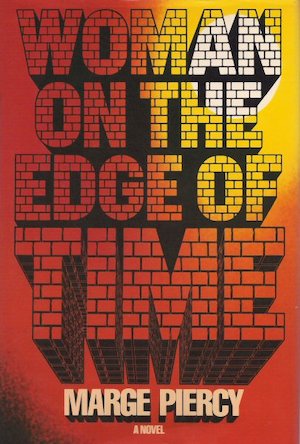A hand falls on my shoulder.
I turn to the wind.
On the paths I see you
walking.When I catch up
person wears another face.
In dreams I touch your mouth.
I first read Marge Piercy’s Woman on the Edge of Time in the late 1980s, a little over a decade out from its 1976 publication. It was a revelation to my teenaged self: a window into the worst of my own time, and into a future where I might actually make sense. It was nothing like the metal-and-dilithium utopia of Star Trek, my previous nomination for the time I really belonged in. I reread it many times, desperate for glimpses of a better world and hints about how to get there. Rereading this year, I find Piercy’s utopia still hopeful, still shocking—and more grown-up than I knew.
Piercy is best known as a mainstream literary author and a poet. But her two science fiction novels are both deeply in conversation with the larger genre. Woman on the Edge of Time responds to feminist utopias of the time with a truly egalitarian world, one that has fought hard to overcome the weight of past oppression and destruction. William Gibson lists it as an inspiration for cyberpunk—and when Piercy read his stuff, she went on to write the Jewish dystopian cyberpunk He, She, and It, the only genre novel I know of to begin with a custody hearing (and worth a whole separate post of its own).
Woman on the Edge of Time starts with Connie Ramos breaking the nose of her niece’s abusive pimp, and getting institutionalized for that violence. She’s been there before, labeled insane for mourning and anger that would be forgiven in someone whiter and richer and maler. In the consent-free world of the 70s asylum, she gets chosen for a research study using neurosurgery to make inmates “saner,” or at least more docile in the face of everyday inequity.
Connie would be convinced of her own sanity, except that she keeps seeing visions of a confident, almost masculine woman with strange-smelling hands, who talks with her briefly and then vanishes. Luciente is reaching out psychically from a possible future, taking advantage of Connie’s own receptive abilities. Eventually she pulls Connie’s mind forward, giving her (and the reader) much-needed breaks from her 20th-century misery to witness and participate in the everyday life of 2137 Mouth-of-Mattapoisett.
Mouth-of-Mattapoisett, as Connie is quick to point out, lacks the trappings of progress that she’s been led to assume are inevitable. No food pills, no gleaming spires, no flying cars. The advances of this future are subtler and kinder, from the three parents assigned to every artificially-gestated child to the use of automation only for jobs that no one wants to do. There are computers, including portable “kenners” (think cell phones with no doomscrolling). There’s the value placed on mental disciplines: not only the psychic powers necessary to the book’s central conceit, but what we’d now call mindfulness and emotional intelligence. There are my actual preferred pronouns: the gender-neutral person/per/pers that don’t erase gender, but emphasize its secondary importance relative to everyone’s shared personhood.
It’s a future not only different from the time when it was written, but from modern progressive assumptions about what a better world might look like. We seek queer joy in a thousand different expressions and shapes of gender, where Luciente’s people barely notice gender except occasionally and recreationally. We embrace multiculturalism and reclaim lost cultural history, where Luciente’s people have broken the link between culture and genetics completely. Yet there are kinships, and Woman on the Edge of Time still feels like a thought-provoking challenge to our assumptions about where we go from here.
In one scene, Connie sees a man nursing, one of the places where this future wields technology for intimacy and equality. She’s upset that this—one of the few places where she’s felt able to claim something for her own—is a gift that anyone can now access. Yet she also fails to recognize—as I suspect Piercy’s critics failed to recognize—the ways that it represents innovation as advanced as any food pill. It’s just not the sort of innovation valued by patriarchy. Or by our own current purveyors of the Approved Future in Silicon Valley. I thought of this scene when an early reader of A Half-Built Garden complained that my own try at a hopeful future can’t seem to pick a tech level—because characters both wear neural interface mesh and nurse their babies on demand. I realized how much my own invisibly-high-tech nursing owed to Piercy’s. How much I’d taken in the message that technology could be tailored to the society we want, rather than reshaping society to technology.
Buy the Book


A Half-Built Garden
Over the course of the novel, Connie comes both to appreciate Luciente’s future, and to understand how tenuous it is. Once, as the brain stimulation project picks up speed, she stumbles into another possible future. For a few hellish minutes, she glimpses a dystopia where women are property shaped by plastic surgery and neurosurgery, where men use those same technologies to become stronger, angrier, better servants to their corporate owners. This is the chapter that Gibson cites as core to cyberpunk; for Connie it’s vivid illustration of how much the choices made in our own time matter. She seems powerless, and yet… there are always ways to fight, and always better and worse worlds begging to be created.
Let me fight like a tiger
and leave something pretty
like a moon snail
on the common beach.
As an adult, the thing that strikes me most about Mouth-of-Mattapoisett is the way the culture takes feedback—“critting” and “warming”—seriously as a project of mutual care rather than an attack vector. It’s something that artists depend on and struggle with now, and that suggests a hard-won change in how we approach communal relationships. It particularly strikes me because, rather than depicting people who are perfect at giving and receiving criticism, Piercy shows people still prone to petty drama, to using the language of progressivism to justify personal feuds—and shows the structures and rituals in place to counter those tendencies. A good life, she suggests, is possible even if humans remain all too human.
Woman on the Edge of Time shaped how I think about possible futures, and what we might do to build a society of mutual care. A Half-Built Garden is my offering to that long conversation.
Someday water will run clear,
salmon will thunder
upstream,
whales will spout just
offshore,
and no more in the depths of
the sea
will the dark bombs roll.Sweet earth, I lie in your
lap,
I borrow your strength,
I win you every day.
Poems quoted from Marge Piercy’s Woman on the Edge of Time.
Ruthanna Emrys’s A Half-Built Garden comes out July 26th. She is also the author of the Innsmouth Legacy series, including Winter Tide and Deep Roots, and co-blogs Reading the Weird on Tor.com. Ruthanna is online on Twitter and Patreon, and offline in a mysterious manor house with her large, chaotic household—mostly mammalian—outside Washington DC.










